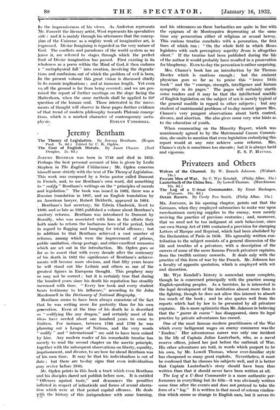Jeremy Bentham
JEREMY BENTHAM was born in 1748 and died in 1832. Perhaps the best personal account of him is given by Leslie Stephen in The English Utilitarians ; Mr. Ogden concerns himself more strictly with the text of The Theory of Legislation. This work was composed by a Swiss pastor called Dumont in French, and, to use Bentham's own word, did something to " codify " Bentham's writings on the " principles of morals and legislation." The book was issued in 1802, there was a Russian translation in 1807, and an English translation by an American lawyer, Robert Heldreth, appeared in 1864.
Bentham's last secretary, Sir Edwin Chadwick, lived to 1890, and as late as 1885 published a volume about Bentham's sanitary reforms. Bentham was introduced to Dumont by Romilly, who was associated with him in the efforts they both made to reform the barbarous laws of the period, both in regard to flogging and hanging for trivial offences ; but M addition to that Bentham achieved a vast number of reforms, among which were the improvement of prisons, public sanitation, cheap postage, and other excellent measures which are set out in the introduction. Mr. Ogden goes so far as to assert that with every decade after the centenary of his death in 1882 the significance of Bentham's achieve- ments will become more obvious, and that fifty years hence he will stand out like Lcibniz and others as one of the greatest figures in European thought. This prophecy may or may not be correct ; but it is certainly true that during the hundred years since his death his reputation has steadily increased with time. Every law book and every student bears testimony to his influence," according. to Sir John Macdonnell in the Dictionary of National Biography.
Bentham seems to have been always conscious of the fact that he was writing more for posterity than for his own generation. Even at the time of his death he is described codifying like any dragon," and certainly most of his ideas have needed about one hundred years to come to fruition. For instance, between 1786 and 1789 he was planning out a League of Nations, and the very words
codify " and " international " are said to have been coined by him. Any modem reader of his remarkable treatise has merely to read the second chapter on the ascetic principle, together with the subsequent observations on liberty, equality, imprisonment, and divorce, to see how far ahead Bentham was of his own time. It may be that his individualism is out of date ; but there are to-day signs that even individualism may revive before. 1940.
Mr. Ogden prints in this book a tract which even Bentham and his disciples dared not publish before now. It is entitled " Offences against taste," and denounces the penalties inflicted in respect of infanticide and forms of sexual aberra- tion which were at that period capital offences. He deals With the history of this jurisprudence with some learning, and his utterances on these barbarities are quite in line with the epigram of de Montesquieu deprecating at the same time any persecution either of religious or sexual heresy. This curious treatise concludes with a peroration, the first lines of which run : " On the whole field in which MoSes legislates with such peremptory asperity Jesus is altogether silent." If the treatise had been published during the life of the author it would probably haVe resulted in a prosecution for blasphemy. Ec en today the peroration is rather surprising.
Mrs. Chances tiook has an introduction by Sir Thomas
Horder which is cautious enough ; but the eminent .
physician goes so far as to praise this " braVe little
book " and the " courage, strength, intelligence and }Malan sympathy M its pages." The pages will certainly startle some readers and it may be that the intellectual muddle of English lekislation on the subject of sex is merely typical of the general muddle in regard to other subjects ; but any student of matrimonial problems of to-day cannot ignore Mrs. Chance's very pungent observations about birth control, divorce, and abortion. She also gives some very wise hints as to the education of youth.
When commenting on the Minority Report, which was unanimously agreed to by the Matrimonial Causes Commis- sion, she omits to mention that even legislation embodying this report would at any rate achieve some reforms. Mrs. Chance's style is sometimes too staccato; but it is always lucid


































 Previous page
Previous page